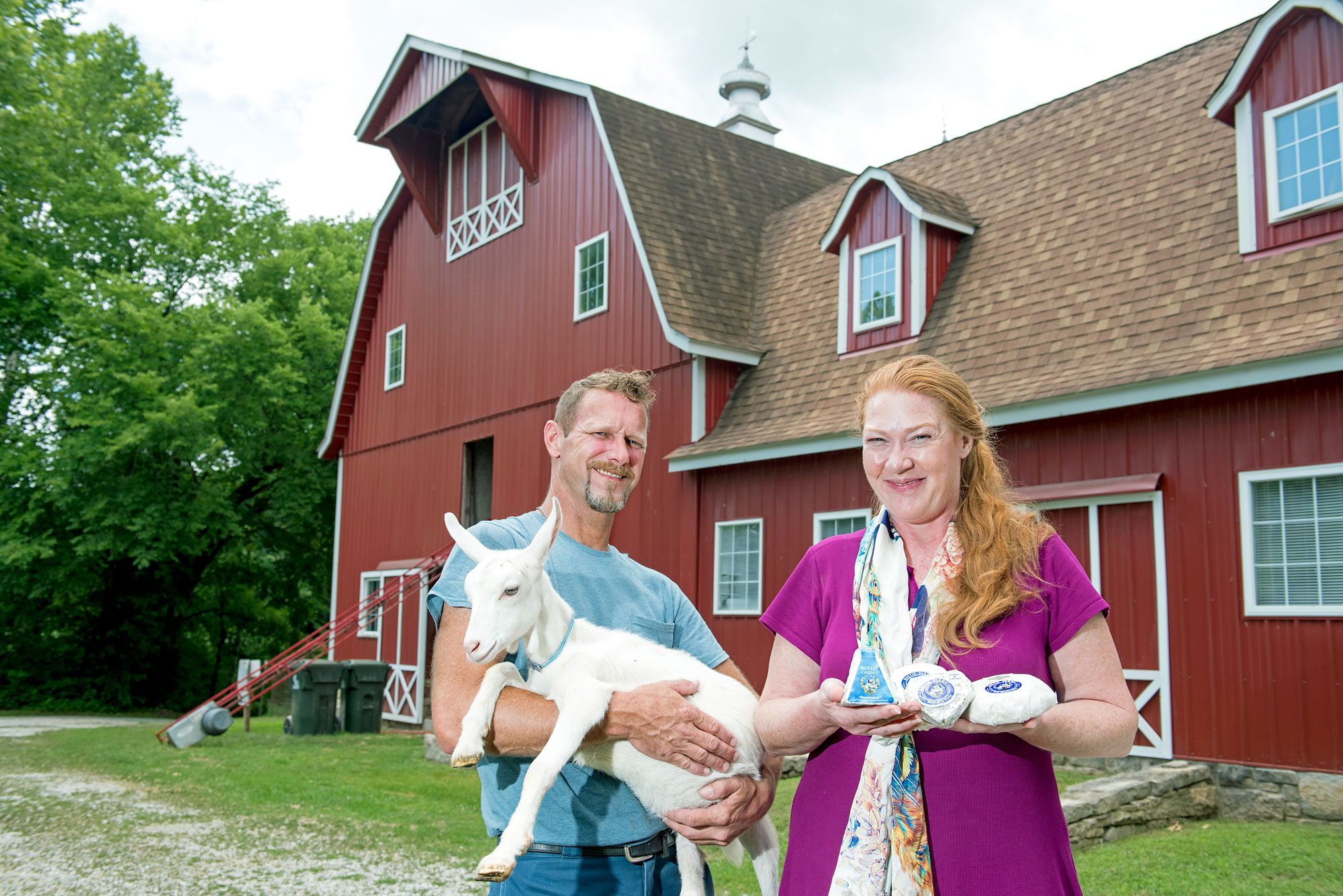
Aged to Perfection
July 19, 2018
Written By Jason Jenkins
After producing award-winning goat cheese for more than a decade, Baetje Farms is poised to begin a new chapter
With the pull of a rope, a trap door at the end of the milking parlor rises. Eight Saanen dairy goats enter, moving in unison like choreographed dancers taking the stage. Each dutifully finds her place along the row of head gates, and a metallic rhythm echoes through the parlor as the gates click close.
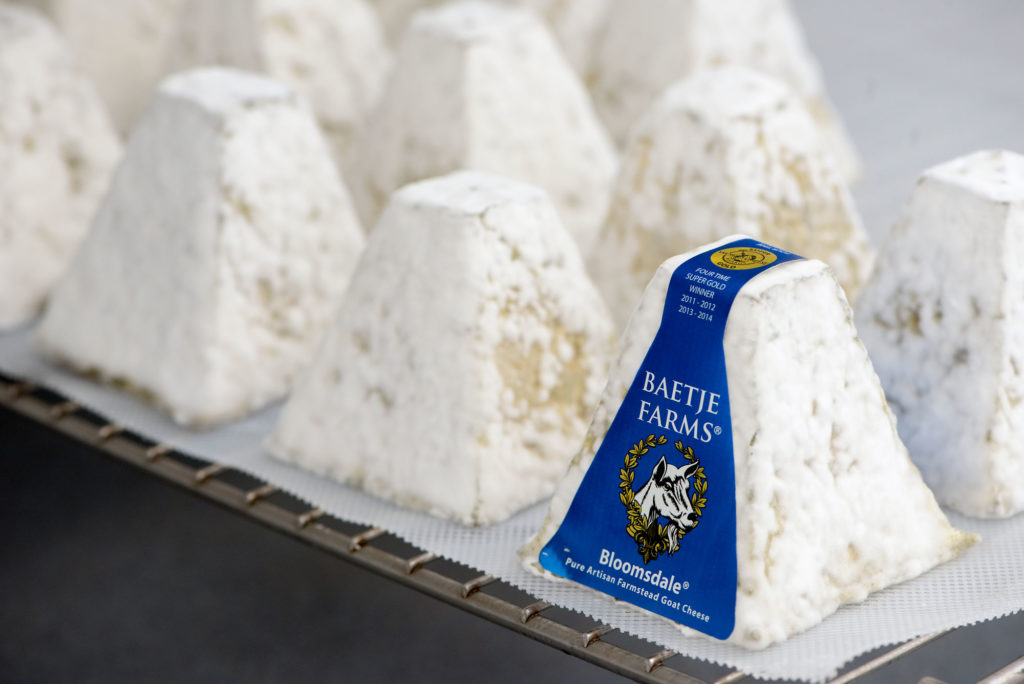
For about the next 10 minutes, the goats contentedly munch on a custom-mixed ration of grain, protein and mineral as Steve Baetje uses a milking machine to gently coax from their udders what could be considered white gold. Then, a quick pull of another rope and a lift of a gate, and the performers exit stage right where they find alfalfa hay brimming from the bunks.
The show repeats until all the lactating goats in the Baetje Farms herd have been milked. Should you miss the 4 a.m. performance, don’t fret. Return in the early evening and catch it all again, as you can twice a day — every day — from early spring through fall.
For more than a decade, Steve and Veronica Baetje have raised goats and made artisan farmstead cheese on their farm just west of Bloomsdale, Mo., in the hills of Ste. Genevieve County. What began as a means of earning supplemental income has become an internationally acclaimed goat dairy and creamery producing both fresh and aged cheeses that rival the French styles that inspired them.
One goat, one dream
The couple’s journey to cheesemaking notoriety began in 1998, when they bought their first goat. At the time, they lived in a Mennonite community in southern Illinois. Steve and Veronica grew up across the street from each other in South County (St. Louis), but after marrying and struggling to have children, they were searching for a simpler life closer to God and the land. The conservative Mennonites offered the respite they sought. Veronica found new inspiration.
“The Mennonite women were very industrious, amazing people,” she says. “They know how to provide their families with the best food. They’re expert gardeners, and they preserve everything. When you eat like that, the food tastes so much better.”
Veronica’s parents had kept a garden, canning vegetables and making preserves. She recalled her mother also making yogurt and her father making cheese a couple of times.
“I remembered them doing that and I thought, ‘Nobody’s doing any dairy products here,’” she says. “I really wanted to play with that.”
At the time, she and Steve didn’t need all the milk a dairy cow could produce, and they couldn’t afford one anyway. They did, however, have enough to purchase one goat and her kid from a member of their church congregation. Armed with determination and a library card, Veronica brought home books on cheesemaking and started to teach herself.
“One really good book was ‘Cheesemaking Made Easy’ by Ricki Carroll,” Veronica says. “She’s an amazing person. I met her once at an American Cheese Society conference, and she actually cried when I told her about how her book helped me begin our company.”
The Baetjes continued to live in the Mennonite community as Veronica learned more about cheesemaking, but times were tough. Steve was self-employed in construction, and it was hard to make ends meet living in an area that Veronica describes as economically depressed. When Steve was offered a job back across the river in Missouri in 2005, they decided it was time to go. They loaded up their herd of milk goats — now numbering 20 plus their kids — in their minister’s livestock trailer and moved to their Bloomsdale farm.
“The community hated to see us go, but at the same time, they understood that we needed to give it a try,” Veronica says. “We bought this property because of the barn, but it was in need of repair. I thought, if we made cheese, we wouldn’t have to worry about not having work. It was our dream.”
While Veronica had experimented with many varieties of cheese from Colby to Parmesan, she was inspired by her new surroundings. Now living but a stone’s throw from Ste. Genevieve — which was founded in 1735 by French Canadian colonists as the first European settlement west of the Mississippi River — she decided to focus her creamery on French-style cheeses.
“When we moved here, all the pieces just fit together,” she says. “I started exploring my passion and making cheese that I wanted to make.”
After making renovations to the barn and constructing a cheese plant, the Baetjes were set to follow their cheesemaking aspirations by 2007. Veronica says at first, they envisioned Steve maintaining his full-time job off the farm while she made goat cheese to sell at the farmer’s market once a week.
“I would make cheese a couple days a week, but I would still have my garden and our own personal time,” Veronica recalls. “Within the first few months, we realized that wasn’t realistic.”
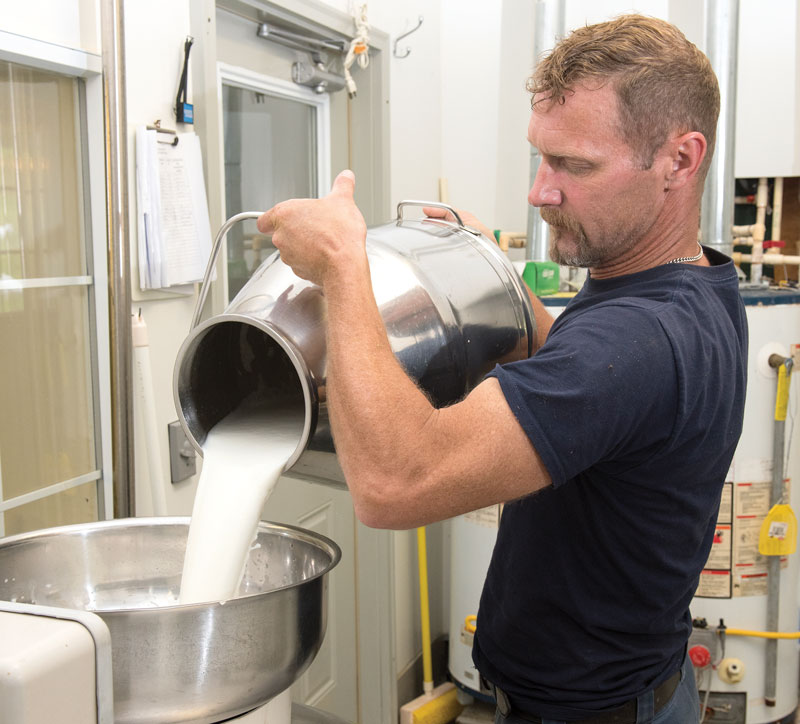 Steve Baetje pours goat’s milk into the creamery’s bulk tank.
Steve Baetje pours goat’s milk into the creamery’s bulk tank.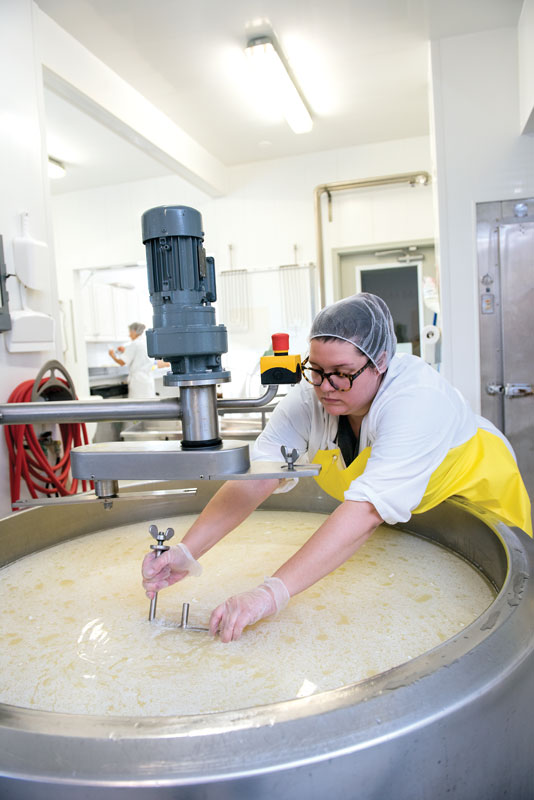 Cheesemaker Alison Penalver of Ste. Genevieve, Mo., uses a knife to cut the curd in a vat of cheese.
Cheesemaker Alison Penalver of Ste. Genevieve, Mo., uses a knife to cut the curd in a vat of cheese.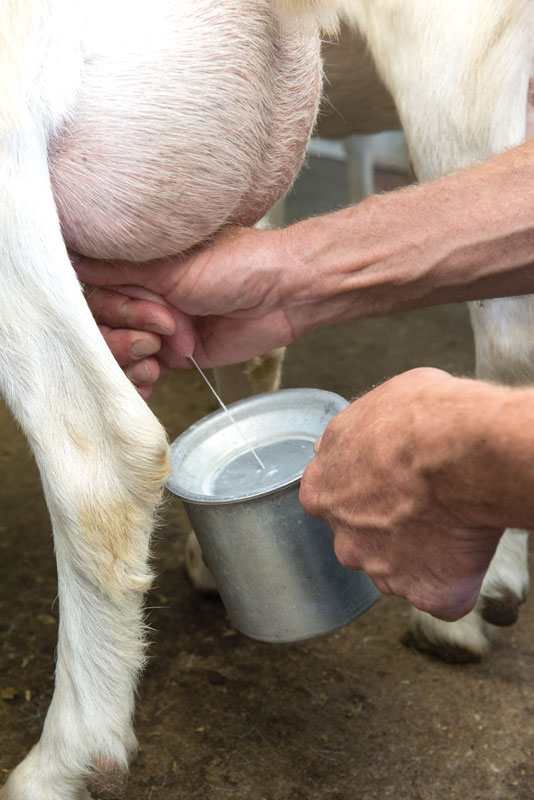 Steve prepares a goat’s udder for milking. Each doe produces three quarts to one gallon of milk per day, depending on her age, stage of lactation and the weather.
Steve prepares a goat’s udder for milking. Each doe produces three quarts to one gallon of milk per day, depending on her age, stage of lactation and the weather.
From goat to grocery
Currently, the Baetjes maintain a herd of nearly 60 lactating Saanen doe goats. Steve says the Swiss breed is quiet, docile and very personable. They are also one of the larger breeds of goat and are more prolific milk producers.
“Saanens are like the Holsteins of the dairy goat world,” he explains. “They give more milk than a Nubian, like a Holstein cow produces more than a Jersey cow, but it’s not as rich in butterfat.”
The goats are bred each fall, and when kids are born in the spring, the does’ lactation cycle begins. Twice daily the goats are milked until they are dried off in the fall to be bred again. Depending on her age, the stage of lactation and the weather, a Saanen doe will produce three quarts to a gallon of milk per day, Steve says.
Changing conditions not only affect the volume of the milk, but they also affect its composition, which in turn affects the cheese.
“When you’re making cheese, it’s not just following a recipe,” Veronica says. “You have to measure pH and identify your conditions. Seasonality plays a role. The goat’s milk has a lactation curve, and there’s more fat and protein in the milk at the beginning of the cycle. In the summer, it really drops off. All that affects yield and how that batch is going to set and how it’s going to be made. And that’s something that is learned over time and experience.”
As Veronica’s own cheesemaking experience grew, she sought out opportunities to improve her techniques. She took advanced classes in Wisconsin and Vermont, learning from instructors who came from Europe to teach Old World farmstead methods. She also got involved in the American Cheese Society, attending that organization’s conference and entering Baetje Farms cheeses in its contest. Accolades soon followed.
“Today, we’ve won more than 70 national and international awards,” Veronica says. “We got involved in the World Cheese Awards, and we won Super Gold for our Bloomsdale — that’s our flagship cheese — four years running. I’ve now been a judge for that contest six years in a row. Of course, I’m not allowed to judge our cheese, but with more than 2,800 entries, there are plenty of cheeses for me to taste and judge.”
In addition to Bloomsdale, which is made in the tradition of French Valençay cheese with its distinctive truncated pyramid shape, Baetje Farms regularly produces other aged cheeses. These include Miette, a bloomy rind sheep and goat milk cheese; Coeur du Clos, a cheese that resembles a French Camembert; and Fleur de la Vallee, a semi-soft, washed rind cheese. They also produce marinated feta and Amoureux, a nutty aged cheese with veins of ash that was inspired by French Morbier cheese.
“And, of course, we have our Coeur de la Crème, which is our heart-shaped fresh chevre,” adds Veronica, who attributes the creamery’s success to their attention to detail, authenticity and passion. “That was the first cheese, and we make it in the shape of a heart because we love what we do.”
Outlets for the creamery’s products have grown well past the one farmer’s market that Veronica first envisioned. Baetje Farms cheeses can be found from New York to California and countless places in between, including Whole Foods.
As the business has grown, the Baetjes have added employees to help with tasks around the farm, including the cheesemaking. They now purchase milk from other sheep and goat dairies to ensure an adequate supply. Several years ago, Veronica formed a relationship with a dairy school in France and sponsors students to come to the United States and practice their craft.
“We’ve had four students from that school, and they’re kind of a part of my family now,” Veronica says. “To be able to share this with these young people is really cool. For me, that’s the best part of the business — the people who I’ve met.”
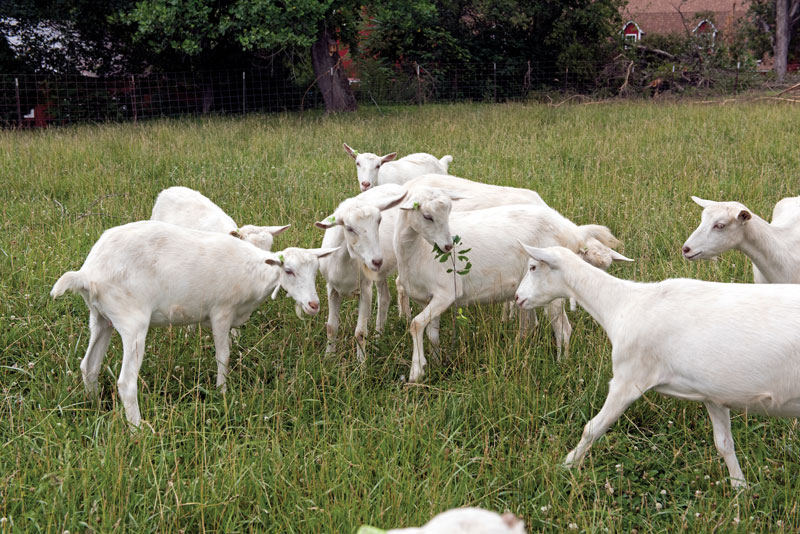 Yearling Saanen goats browse in a pasture at Baetje Farms.
Yearling Saanen goats browse in a pasture at Baetje Farms.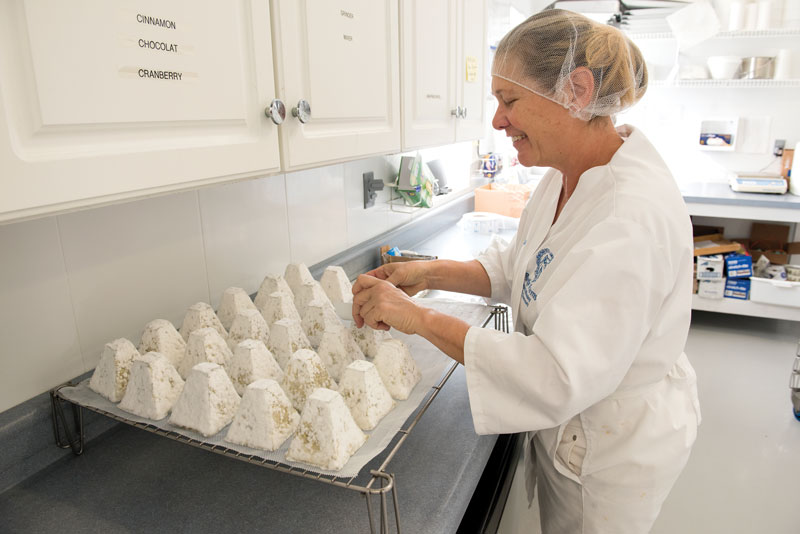 Andy Maguire of Red Rock, Texas, lends a hand and helps package Bloomsdale cheese.
Andy Maguire of Red Rock, Texas, lends a hand and helps package Bloomsdale cheese.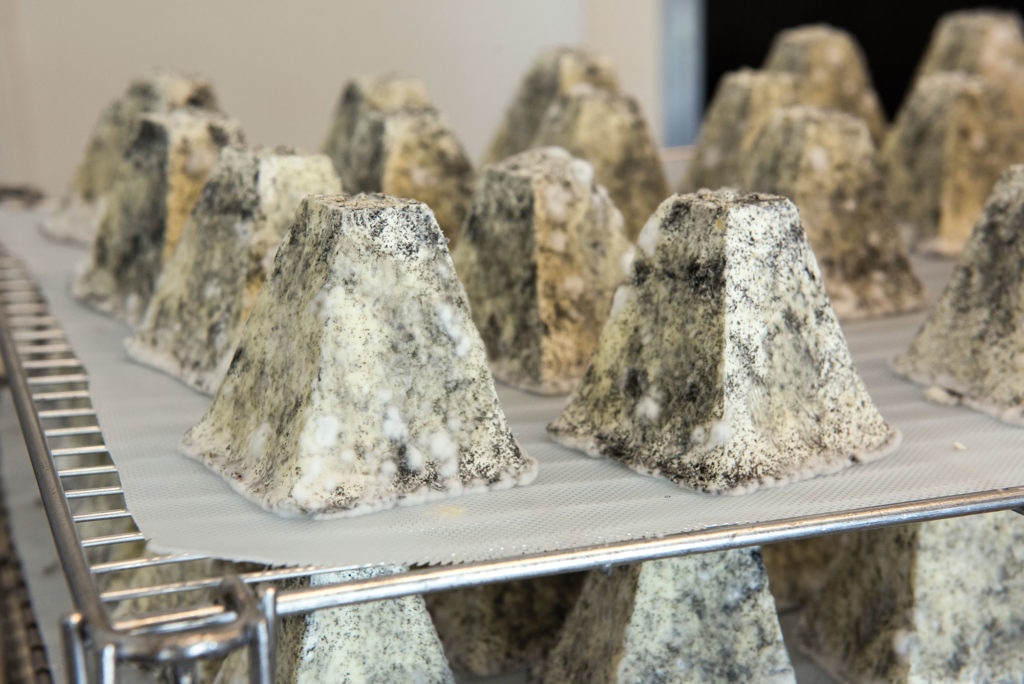 Bloomsdale is considered a mold-ripened cheese. After being formed into its pyramid shape, the cheese is rolled in a mixture of pine ash and salt. Then, it’s allowed to age until it forms a bloom of white mold.
Bloomsdale is considered a mold-ripened cheese. After being formed into its pyramid shape, the cheese is rolled in a mixture of pine ash and salt. Then, it’s allowed to age until it forms a bloom of white mold.
A New Chapter
Much has changed at Baetje Farms since Steve and Veronica descended into this Ste. Genevieve County valley. After only a few years, the demands of the creamery required the pair’s undivided attention, and Steve left his off-farm job to work with the goats exclusively. As employees were added, responsibilities shifted.
“In the beginning, you’re doing everything,” Veronica says, noting that the previous day, she woke at 2 a.m. in order to make cheese deliveries in Kansas City. “You’re in the trenches, doing all the jobs everywhere from the farm to the farmer’s market, and that’s hard. Then as you grow, you become a manager and have people to help with tasks. We still put in the hours, but they’re different kinds of hours. We have a little more flexibility.”
But even with that flexibility, the couple came to the realization earlier this year that for Baetje Farms to grow further, it needs more time than what two people can pour into it.
“For a husband-and-wife team, we’re limited as to how far we can take the business,” Veronica says. “We’ve taken it to this level, and now we’re looking for someone who is really interested in being able to take it to the next level.”
In May, they officially announced that the dairy and creamery would be sold turnkey with its trademarked brand and logo, customer base and distribution, all recipes and techniques for their cheeses, all equipment and property — and the herd of Saanen dairy goats. Asking price was set at $1.5 million.
“We’ve had individuals show interest who would like us to stay involved long-term, and we’re open for that. I would like to be involved,” Veronica says. “At the same time, it’d be nice to not work so many extended hours.”
While she and Steve stole away to Aruba for a week last year, it was the first vacation they had been on together since starting Baetje Farms. Veronica says she has other travel in mind, too.
“I know it sounds crazy, but I love penguins,” she says. “I would love to board a National Geographic research vessel and retrace Shackleton’s Antarctic journey. I’d like to stand on the shore of South Georgia Island, see icebergs floating in that cold, blue ocean, and meet the penguins.”
For more information on Baetje Farms LLC, visit www.baetjefarms.com or call 573-483-9021. Anyone interested in purchasing the business may contact Jamie Keller at 618-713-7677 or [email protected] to schedule an appointment.

